作文-森林的重要性
- 格式:docx
- 大小:15.45 KB
- 文档页数:2

保护森林的作文在我们生活的环境中,森林是非常重要的自然资源。
它不仅是动植物的家园,也是地球的“肺”,能够吸收二氧化碳,释放氧气,调节气候,保护水源,减少土壤侵蚀,防止洪水等。
因此,保护森林对于人类和整个地球来说都是非常重要的。
首先,保护森林对于维护生态平衡至关重要。
森林是地球上最重要的生态系统之一,它们承载着丰富的生物多样性,是许多动植物的栖息地。
保护森林意味着保护各种动植物的生存空间,有助于维持生态平衡,保护地球的生态系统。
其次,保护森林对于气候调节非常重要。
森林在长期的生长过程中,能够吸收大量的二氧化碳,释放氧气,有助于净化空气。
同时,森林能够调节气温,减少气候变化的影响,对于地球的气候稳定起着非常重要的作用。
此外,保护森林对于保护水源也至关重要。
森林的树木能够保持土壤的稳定,减少水土流失,保护水源不受污染。
同时,森林能够有效地保持水分,减少洪水的发生,保护周围的生态环境。
然而,当前全球范围内森林遭受到了严重的砍伐和破坏。
大量的森林被砍伐用于商业开发、农业用地和城市建设,导致了生态平衡的破坏,气候变化的加剧,水源的减少等问题。
因此,我们每个人都应该积极参与保护森林的行动。
首先,我们可以从日常生活做起,减少使用纸张和木材制品,选择使用可再生资源或者替代品。
其次,我们可以积极参与植树造林的活动,为森林的生长贡献自己的力量。
另外,我们也可以通过宣传教育的方式,提高大众对于森林保护的意识,鼓励更多的人加入到保护森林的行动中来。
总之,保护森林是我们每个人的责任,它关系着整个地球的生态平衡和永续发展。
我们应该从自身做起,积极参与到保护森林的行动中来,为我们共同的家园贡献自己的一份力量。
希望通过我们每个人的努力,可以让森林永远繁茂,地球永远美丽。
保护森林,就是保护地球,也是保护我们自己。
让我们携起手来,共同努力,为了美好的未来而奋斗!。
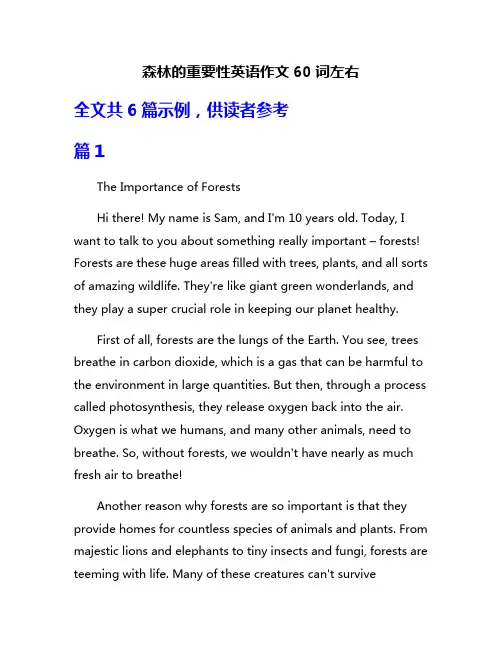
森林的重要性英语作文60词左右全文共6篇示例,供读者参考篇1The Importance of ForestsHi there! My name is Sam, and I'm 10 years old. Today, I want to talk to you about something really important – forests! Forests are these huge areas filled with trees, plants, and all sorts of amazing wildlife. They're like giant green wonderlands, and they play a super crucial role in keeping our planet healthy.First of all, forests are the lungs of the Earth. You see, trees breathe in carbon dioxide, which is a gas that can be harmful to the environment in large quantities. But then, through a process called photosynthesis, they release oxygen back into the air. Oxygen is what we humans, and many other animals, need to breathe. So, without forests, we wouldn't have nearly as much fresh air to breathe!Another reason why forests are so important is that they provide homes for countless species of animals and plants. From majestic lions and elephants to tiny insects and fungi, forests are teeming with life. Many of these creatures can't surviveanywhere else, so if we lose the forests, we could lose entire species forever. That would be really sad!Forests also play a huge role in protecting the soil and preventing erosion. The roots of trees hold the soil together, and their leaves and branches shield the ground from heavy rain and wind. Without forests, the soil would wash away or blow away, making it much harder for plants to grow and for animals to find food.Speaking of food, forests are a vital source of food and medicine for many people around the world. Lots of fruits, nuts, herbs, and spices come from forests. Indigenous communities, who have lived in and around forests for centuries, have a deep knowledge of the medicinal properties of various plants found in these ecosystems.But that's not all! Forests are also incredibly important for our climate. They absorb and store massive amounts of carbon dioxide, which helps to reduce the greenhouse effect and slow down climate change. Deforestation, or cutting down forests, releases all that stored carbon back into the atmosphere, contributing to global warming.Forests even influence the water cycle and help regulate rainfall patterns. The trees release moisture into the air through aprocess called transpiration, and this moisture eventually falls back to Earth as rain or snow. Forests also help prevent floods by absorbing excess water and releasing it slowly over time.Sadly, many forests around the world are under threat from things like logging, mining, and urbanization. When forests are destroyed, it not only puts the plants and animals living there at risk, but it also disrupts the entire ecosystem and can havefar-reaching consequences for the planet.That's why it's so important for all of us to do our part to protect and preserve forests. We can support organizations that work to conserve and restore forests, reduce our consumption of products that contribute to deforestation, and even plant trees in our own communities.Forests are truly magical places, filled with wonder and life. They provide us with so many benefits, from clean air to breathe and food to eat, to helping regulate our climate and protecting the Earth's delicate ecosystems. It's up to all of us to be good stewards of these incredible natural resources, so that future generations can continue to enjoy and benefit from the incredible gifts that forests offer.So, the next time you're out in nature, take a moment to appreciate the towering trees and the lush greenery around you.Listen to the birds singing and the leaves rustling in the breeze. Forests are so much more than just collections of trees – they're living, breathing ecosystems that sustain life on our planet. Let's do our part to protect and cherish them, for the sake of the Earth and all its inhabitants.篇2The Wonderful World of ForestsForests are some of the most amazing places on Earth! They are like giant green cathedrals filled with towering tree trunks reaching up to the sky. From the smallest seedling to the mightiest oak, forests are brimming with life and wonder.I love hiking through the woods near my home and taking in all the sights, sounds, and smells. The fresh earthy scent of damp soil and decaying leaves fills my nose. Birds chirp and chatter high up in the leafy canopy. Squirrels scamper back and forth, busily gathering nuts and seeds. The crunch of fallen branches under my feet mixes with the whisper of the wind rustling through the trees. It's like entering a secret world!Forests are home to an incredible array of plants and animals. Massive trees provide shelter and food for countless species of insects, birds, mammals, and more. Vines, ferns, and wildflowerscarpet the forest floor in a lush green carpet. Mushrooms and fungi pop up in the strangest of places. There are frogs hopping, deer grazing, raccoons foraging - a busy neighborhood thriving under the leafy roof.Beyond their beauty, forests play a hugely important role for the entire planet. They help keep our air fresh by absorbing carbon dioxide and producing oxygen through photosynthesis. They filter rainwater and prevent flooding by allowing rain to slowly seep into the ground. Ancient forests have been around for millions of years and store an amazing amount of carbon that would otherwise contribute to global warming.s depend on forests more than you might think. Products like paper, furniture, houses, and even medicine all come from trees and plants in the forest. Indigenous peoples have called the forest home for centuries, living off the abundant natural resources in sustainable ways. Even city folks enjoy parks, gardens, and woods for recreation like hiking, camping, and picnicking.Sadly, forests around the world are being cleared at an alarming rate. As more land is needed for farms, cities, roads, and logging, we are rapidly losing these precious green spaces. Plant and animal species are losing their habitats, leading many to become endangered or even go extinct. The destruction offorests also worsens climate change by releasing stored carbon into the atmosphere.We must do more to protect and preserve forests for future generations. It's important to practice sustainable forestry by replanting areas that are logged. Using paper, wood and other forest products wisely and recycling helps reduce demand. Establishing protected parks, reserves, and conservation areas keeps forests safe from development. Supporting organizations working to plant trees and restore forests also makes a big difference.The next time you are out in the woods, take a moment to appreciate the living, breathing wonder all around you. Those mighty trees standing guard have been there for hundreds of years and are vital for innumerable species, our environment, and humanity itself. We are all caretakers of the amazing legacy of the forests - let's make sure they remain vibrant and healthy for lifetimes to come!篇3The Wonderful World of ForestsForests are some of the most amazing places on Earth! They are home to countless plants and animals, and they provide uswith so many important things that we need to live. Let me tell you all about the wonderful world of forests and why they are so vital.First of all, forests give us the air that we breathe. The trees take in carbon dioxide, which is a gas that isn't good for us, and they release oxygen, which is the air that keeps us alive. Without forests, we wouldn't have enough oxygen to breathe! Trees are like the lungs of the planet.Forests also help keep our climate stable. You know how some places are really hot, and other places are really cold? Well, forests play a big role in making sure the temperatures don't get too extreme. The trees absorb heat from the sun and release water vapor into the air, which cools things down. They act like natural air conditioners!Another important thing about forests is that they provide habitats for so many different kinds of animals. Big animals like bears, deer, and moose live in the forests. Smaller creatures like squirrels, raccoons, and rabbits also make their homes there. And let's not forget about all the birds, insects, and reptiles that depend on forests for their survival. Without forests, many species would have nowhere to live and might go extinct.Forests are incredible places for plants, too. All sorts of flowers, shrubs, vines, and mosses grow beneath the canopy of trees. Some plants only grow in certain types of forests. Many plants that we use for food and medicine also come from forests, so forests are important for our health and wellbeing.Do you like hiking, camping, or just being outdoors? Well, you can thank forests for providing us with beautiful natural spaces for recreation and exploration. Forests offer peaceful escapes from the hustle and bustle of cities and towns. They are wonderful places to connect with nature and appreciate the beauty of the world around us.Forests even provide us with many products that we use every day. Wood from trees is used to build our homes, furniture, and countless other items. Paper comes from trees, too. Many foods like maple syrup, nuts, mushrooms, and berries are harvested from forests. Some medicines are also made from plants that grow in forests.As you can see, forests play a huge role in our lives and in the health of our planet. But sadly, forests all over the world are being damaged or destroyed by things like deforestation (cutting down trees), forest fires, pest infestations, and climate change. When forests disappear, it has serious consequences forthe environment and for all the living things that depend on them – including us humans.That's why it's so important for us to protect and take care of our forests. We can do things like reducing our use of paper and wood products, supporting organizations that work to conserve forests, and learning about sustainable forestry practices. Every little bit helps!Forests truly are incredible places. They give us so much and ask for so little in return. By appreciating and protecting these amazing ecosystems, we can ensure that forests will be around for many generations to come. The next time you're outside, take a deep breath of that fresh forest air and give thanks for the wonderful world of forests!篇4The Importance of ForestsForests are so cool! They are these huge areas filled with tall trees, bushes, flowers, and all kinds of animals. I love going hiking in the woods near my house and seeing all the different plants and critters. Forests are really important for so many reasons.First of all, forests help make the air we breathe nice and clean. The trees take in carbon dioxide, which is a gas that isn't good for us to breathe too much of. Then the trees use the carbon dioxide to make their food through photosynthesis. At the same time, they release oxygen, which is the air that we need to survive! Without forests, there would be way less oxygen and way more carbon dioxide in the air. That would make it really hard for people and animals to breathe.Forests also help keep our planet from getting too hot. You've probably learned about global warming, which is caused by gases like carbon dioxide trapping heat from the sun close to the Earth. Well, trees actually absorb and store a bunch of that carbon dioxide, so having more forests means less global warming. The shade from the trees also keeps forest areas cooler than places without trees. If we cut down too many forests, the whole world could get really hot!Another important thing about forests is that they help prevent soil erosion and flooding. The roots of the trees and plants hold the soil together tightly. If there weren't any forests, the soil would wash away much more easily whenever it rains or storms. Plus, the trees and plants soak up lots of rainwater, preventing it from flooding the area as quickly. Flooding can bereally dangerous and damaging to houses and cities. Forests act like a giant sponge that catches the extra water.Forests are also home to an incredible variety of plants and animals that can't survive anywhere else. There are beautiful bright flowers, giant towering trees, scurrying squirrels and chipmunks, soaring birds of prey, grazing deer, and so many other living things. Some forest animals, like certain types of monkeys or birds, can only be found in specific forests. If those forests disappear, those species could go completely extinct! We need to protect forests so the other living creatures that depend on them can keep their homes.Speaking of homes, forests provide lots of natural resources that humans use to build houses, furniture, and all sorts of other things we need. Wood from trees is used to construct buildings, floors, doors, cabinets, and much more. Many medicines also originally come from plants and ingredients found in forests. In some parts of the world, forests are a source of food and income for many families. Lots of people rely on forests.Another amazing thing is that walking through a forest can make you feel happier and more relaxed. There's just something calming and peaceful about being out in nature surrounded by trees, plants, and the sounds of critters. Forests are quiet placesto get away from the busy noises and stresses of everyday life. They let you slow down and appreciate the natural world. If you're ever feeling worried or upset about something, I recommend taking a nice long hike through the woods. It always cheers me up!Finally, old forests can teach us about history. The rings inside very old tree trunks can show what the climate and environment was like hundreds or even thousands of years ago when that tree first started growing. Scientists study tree rings to learn about major events, climate patterns, and how our planet has changed over time. Some of the oldest trees are like living records of the past! We have to protect old forest areas so we can keep learning from them.As you can see, forests are absolutely vital to the health of our whole planet and all the life on it, including humans. They purify our air, regulate temperatures, prevent erosion, provide homes for animals and resources for people, help reduce stress, and reveal ancient history. We should all make an effort to take care of our forests by not littering, being careful with fires, planting new trees, and learning about conservation. Forests are an incredible gift from nature, and we need to treasure them.Let's all do our part to keep forests thriving for generations to come!篇5The Importance of ForestsHi there! My name is Sam, and I'm a 10-year-old kid who really loves nature. Today, I want to talk to you about something super important – forests! Forests are these amazing places filled with tall trees, cute little critters, and all sorts of cool plants and flowers. But they're not just pretty to look at – forests are actually really, really important for our planet and for all of us living on it. Let me tell you why!First of all, forests give us the air we breathe. You might have learned in school that trees take in carbon dioxide (which is a gas that can be harmful in large amounts) and release oxygen through a process called photosynthesis. Oxygen is what humans and animals need to breathe, so without trees, we wouldn't have enough fresh air! Isn't that crazy? Forests are like giant oxygen factories for the whole world.Forests also help keep our planet's temperature in a good range. The trees and other plants absorb and store a lot of the sun's heat, preventing the Earth from getting too hot. And whenit rains, the leaves and branches catch a lot of the water, which then slowly drips down to the ground instead of causing floods. This helps keep temperatures nice and balanced.Another awesome thing about forests is that they provide homes for so many different animals. From the tiny insects crawling on the ground to the big bears and wolves roaming around, forests shelter all sorts of wildlife. Without forests, a lot of these animal species wouldn't have anywhere to live and might go extinct. That would be so sad!Forests are also really important for humans. Many indigenous communities and villages rely on forests for food, medicine, shelter, and other resources. Plus, forests are a source of wood that we use to build houses, furniture, and all kinds of other things we need. But it's crucial that we harvest and use these resources responsibly, without damaging the forests too much.Speaking of damaging forests, deforestation is a huge problem. Deforestation means cutting down or burning large areas of forest land, often to make room for farms, cities, or roads. This destroys the homes of countless animals and plants, and it also releases a ton of carbon dioxide into the air, which contributes to climate change and global warming. We need tofind better ways to meet our needs without destroying these precious forests.You might be wondering what a kid like me can do to help protect forests. Well, there are actually lots of little things we can all do! Planting new trees, recycling paper and wood products, and spreading awareness about the importance of forests are just a few examples. Every little bit helps!Forests are magical, life-giving places that deserve our respect and protection. They provide us with so many amazing benefits, from the air we breathe to the homes they create for all sorts of cool critters. We need to be good stewards of our forests and make sure they stay healthy and thriving for generations to come. If we all do our part, we can keep these incredible natural wonders around for a long, long time.Thanks for reading, friends! I hope you learned something new about how awesome and important forests are. Now go explore a forest near you and see how many different plants and animals you can spot. Just remember to tread lightly and leave no trace behind. Our forests are counting on us!篇6The Amazing ForestsTrees are awesome! They're so tall and green, reaching up to the sky. And you know what's even better than a single tree? A whole forest full of trees! Forests are like giant treehouses that cover the earth. They're home to countless plants and animals, and they're really important for our planet.Let me tell you about some of the incredible things forests do for us. First off, they help us breathe! The trees take in carbon dioxide, that stuff we exhale when we breathe out, and they release oxygen for us to breathe in. It's like the forest is a huge oxygen factory! Without forests, we'd be gasping for air. Isn't that wild?Forests also provide homes for so many different creatures. You've got squirrels and birds making nests in the branches, deer munching on the leaves, and bears taking naps in the bushes. Insects, reptiles, and all sorts of other animals live their whole lives in the forest. If we didn't have forests, a lot of animal species wouldn't have anywhere to go.Another cool thing about forests is that they help keep our air and water clean. The trees act like giant filters, taking pollutants out of the air we breathe. And when it rains, the forest soaks up a lot of that water, cleaning it before it flows into streams, rivers, and lakes. Pretty neat, huh?You know what else forests do? They protect the soil from eroding away. Their roots hold the soil in place, kind of like nature's superglue. And when trees shed their leaves, that creates a spongy layer on the forest floor that helps the soil stay put when it rains.Oh, and let's not forget how forests fight climate change! Those trees absorb a bunch of carbon dioxide from the atmosphere, which helps reduce the greenhouse gases that cause global warming. Forests are like earth's air conditioners, keeping our planet cool.But that's not all! Forests are a renewable source of wood that we use to build houses, make paper, and even fuel fires to keep us warm. As long as we replant trees when we cut them down, we'll always have more forests growing.I bet you're wondering what you can do to help protect these incredible forests, right? Well, for starters, don't litter when you're hiking or camping. That trash can really mess up the forest environment. You can also plant trees whenever you get the chance. Every little tree counts!Conserving forests should be a major priority because they do so much for our planet. We rely on them for clean air, cleanwater, wildlife habitats, climate control, and important resources. Without forests, earth would be a very different place.Next time you're outside, look around at all the trees in your neighborhood or local park. Those are like tiny forests right in your backyard! And when you think about the vast forests that stretch across the continents, covering the earth with their green canopies, it's just mind-blowing. We're so lucky to have these living wonders surrounding us.Forests are one of nature's great marvels, and we need to protect them with all we've got. Their importance can't be overstated. So spread the word, plant some trees, and let's make sure these beautiful forests remain a part of our world for generations to come!。
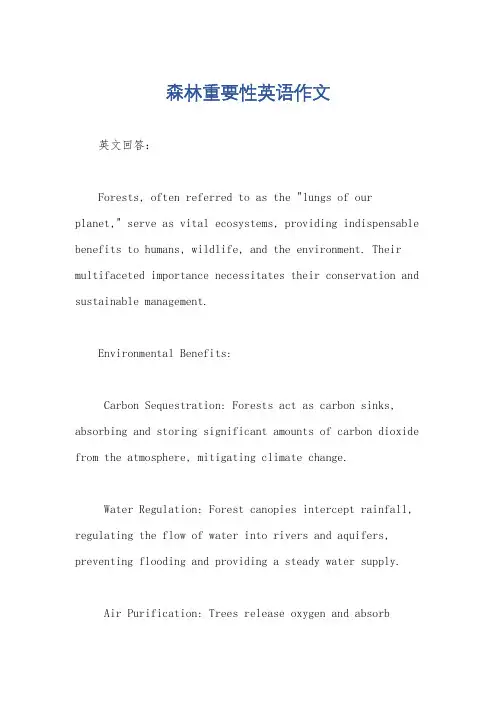
森林重要性英语作文英文回答:Forests, often referred to as the "lungs of our planet," serve as vital ecosystems, providing indispensable benefits to humans, wildlife, and the environment. Their multifaceted importance necessitates their conservation and sustainable management.Environmental Benefits:Carbon Sequestration: Forests act as carbon sinks, absorbing and storing significant amounts of carbon dioxide from the atmosphere, mitigating climate change.Water Regulation: Forest canopies intercept rainfall, regulating the flow of water into rivers and aquifers, preventing flooding and providing a steady water supply.Air Purification: Trees release oxygen and absorbharmful pollutants, purifying the air and improving air quality.Erosion Prevention: Forest root systems stabilize soil, preventing erosion and protecting watersheds.Ecological Benefits:Biodiversity Hotspot: Forests harbor over 80% of the world's terrestrial biodiversity, providing habitats for a vast array of plants, animals, and insects.Ecosystem Services: Forests provide essential ecosystem services such as pollination, nutrient cycling, and seed dispersal, supporting the food chain.Wildlife Corridor: Forest corridors allow animals to move and migrate, maintaining genetic diversity and connectivity between populations.Economic Benefits:Timber and Non-Timber Products: Forests provide timber for construction and paper, as well as non-timber products such as fruits, medicines, and recreation.Tourism and Recreation: Forests offer opportunitiesfor tourism, recreation, and spiritual retreats, contributing to local economies.Carbon Credits: Forests can generate carbon credits by sequestering carbon dioxide, providing incentives for their conservation and sustainable management.Social Benefits:Community and Cultural Identity: Forests are oftentied to cultural and spiritual traditions, providing a sense of place and identity for local communities.Health and Well-being: Spending time in forests has been shown to improve mental and physical health, reducing stress and promoting relaxation.Education and Research: Forests serve as living laboratories for scientific research and education, providing insights into the natural world and its importance.中文回答:森林的重要性。

第1篇大家好!今天,我非常荣幸能够站在这里,与大家共同探讨一个与我们息息相关的话题——保护森林安全。
森林,是地球的肺,是人类赖以生存的家园。
然而,随着人类社会的快速发展,森林资源面临着前所未有的压力。
今天,我将从以下几个方面阐述保护森林安全的重要性,以及我们每个人应该如何行动。
一、保护森林安全的重要性1. 维护生态平衡森林是地球上最重要的生态系统之一,它为地球上的生物提供了生存的家园。
森林中的动植物种类繁多,它们相互依存,形成了一个复杂的生态系统。
如果我们破坏森林,就会打破这个平衡,导致生物多样性减少,甚至引发一系列生态灾难。
2. 保障水资源森林被称为“绿色水库”,它可以调节水源,保持水土。
森林中的树木和植物能够吸收水分,减缓地表径流,从而减少洪水和泥石流等自然灾害的发生。
此外,森林还能提高地下水位,为人类提供清洁的水资源。
3. 改善空气质量森林具有强大的空气净化功能,它可以吸收二氧化碳,释放氧气,改善空气质量。
据统计,一棵成年树木每年可以吸收约22公斤的二氧化碳。
因此,保护森林对于改善全球气候具有重要意义。
4. 促进经济发展森林资源丰富,可以为人类提供木材、药材、果实等多种产品。
同时,森林旅游、生态农业等产业也逐渐兴起,为经济发展注入新的活力。
二、当前森林安全面临的挑战1. 森林砍伐过度随着人口增长和经济发展,对木材、林产品的需求不断增长。
一些国家和地区为了追求经济利益,过度砍伐森林,导致森林资源锐减。
2. 森林火灾频发近年来,全球气候变暖导致极端天气事件增多,森林火灾频发。
火灾不仅烧毁大量森林资源,还威胁到人类的生命财产安全。
3. 森林病虫害加剧由于森林生态环境恶化,森林病虫害日益严重。
病虫害不仅导致树木死亡,还降低了森林的防护功能。
4. 森林侵占现象严重为了发展农业、建设城市等,一些地区将森林转化为耕地或建设用地,导致森林面积减少。
三、保护森林安全的行动措施1. 加强森林资源保护法律法规建设完善森林资源保护法律法规,加大对违法行为的打击力度,确保森林资源的合理利用。

关于森林对人类的好处的作文400字作文范文啊!眼睁睁地看着小树的兄弟姐妹和爸爸妈妈被砍走了。
小树他是多么伤心啊!事情是这样的:工人们想要让人们过上富裕的生活,就把这以前的一大片森林,砍成了只剩几棵小树了。
但是他们没有考虑会有污染,所以,他们还在尽情的砍,并且催促那些小树们快点长大。
有一棵小树生气了,她把她的方法给他的伙伴们说。
但是伙伴们不同意她的观点,她的伙伴们说人类应该给人类服务,你可别罚得太重了。
她觉得也有道理,吹了一声口哨,小沙尘暴们纷纷都来了,人类知道了自己的过错并又种了许多树,小树们都笑了。
我们要保护野生动物,因为我们保护野生动物,野生动物对我们人类也会很友好。
比如说燕子,燕子能帮我们把田里的害虫吃掉。
如果我们人类杀害捕捉它们,它们会吃掉那些常常来搔扰我们的蚊子,让我们更好地生活吗?没有了燕子,我们的周围变得很多害虫,这些害虫对我们人类有很大的坏处呀!我还举个例子。
比如说青蛙,青蛙也能帮我们吃田里的害虫,可以说是田里的警察。
我们支捕杀他们,一旦没有了青蛙,田里的害虫越来越多,害虫不断地吃菜,难道我们会有美好的丰收吗?我还举个例子。
比如说啄木鸟,啄木鸟是森林中的医生,它可以帮我们吃掉树里的害虫,让树恢复健康。
我们杀害它们,树木的害虫会越来越多,树木会慢慢地减少。
地球上没有树,会发洪水、地震。
我最后举个例子。
比如说猫头鹰,猫头鹰捉田鼠,是对我们人类有好处的,人类却常常捕猎它们。
没有猫头鹰,田鼠会增加。
田鼠吃的庄稼和菜就更多了,我们人类一样没有好的收成。
所以,我们要保护以上的动物。
同时,我们还要保护其他的野生动物!展开全部最近,我们学校开展了森林防火安全教育,大家都知道森林是人类的‘摇篮’,人类依赖于森林它不仅能给我们提供丰富的木材和林副产品,森林有地球之肺的美称,它能大量地吸收二氧化碳,不断制造人类和其他生物所需的氧气。
森林是氧气制造厂、是粉尘过滤器、是天然蓄水库、是天然空调……森林带给我们无穷无尽的好处!森林是整个国民经济持续、快速、健康发展的基础,它在国家经济建设中具有不可替代的地位和作用。

爱护森林的作文
森林,是地球上最宝贵的资源之一。
它们不仅能为我们提供氧气和木材,还是许多动植物的家园。
然而,由于人类的不当行为和环境污染,全球范围内的森林面临着严重的威胁。
因此,我们每个人都有责任去爱护森林,保护我们赖以生存的绿色家园。
首先,我们应该从自身做起,养成良好的环保习惯。
比如,我们可以减少使用纸张,尽量使用电子文档和电子邮件来替代纸质文件和信件。
此外,我们还可以通过回收利用废纸、废塑料等垃圾,减少对森林资源的消耗。
只有当每个人都意识到自己的行为对环境的影响时,我们才能真正做到爱护森林。
其次,政府和相关部门也应该加强对森林资源的保护和管理。
他们可以制定更加严格的法律法规,禁止滥伐和破坏森林的行为。
同时,加大对森林资源的监测和保护力度,确保森林资源得到有效的保护和合理的利用。
只有政府和社会各界共同努力,才能更好地保护我们的森林资源。
最后,我们还应该加强对森林保护意识的宣传和教育。
通过开展各种形式的宣传活动,让更多的人了解森林资源的重要性,激发
大家保护森林的热情。
同时,学校和社会机构也应该加强对森林保护知识的教育,培养学生和公众的环保意识,让他们从小就养成爱护森林的习惯。
总之,爱护森林是我们每个人的责任。
只有当每个人都意识到森林对我们生存的重要性,才能更好地保护和利用森林资源。
希望通过我们每个人的努力,能够让我们的森林资源得到更好的保护和利用,为我们的子孙后代留下一个更加美好的家园。
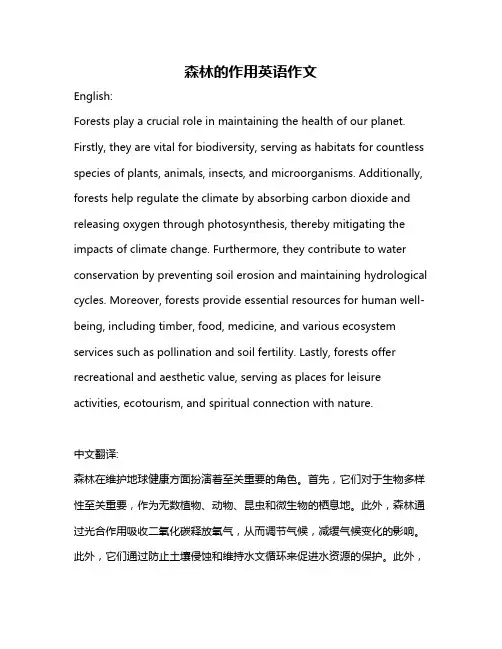
森林的作用英语作文English:Forests play a crucial role in maintaining the health of our planet. Firstly, they are vital for biodiversity, serving as habitats for countless species of plants, animals, insects, and microorganisms. Additionally, forests help regulate the climate by absorbing carbon dioxide and releasing oxygen through photosynthesis, thereby mitigating the impacts of climate change. Furthermore, they contribute to water conservation by preventing soil erosion and maintaining hydrological cycles. Moreover, forests provide essential resources for human well-being, including timber, food, medicine, and various ecosystem services such as pollination and soil fertility. Lastly, forests offer recreational and aesthetic value, serving as places for leisure activities, ecotourism, and spiritual connection with nature.中文翻译:森林在维护地球健康方面扮演着至关重要的角色。
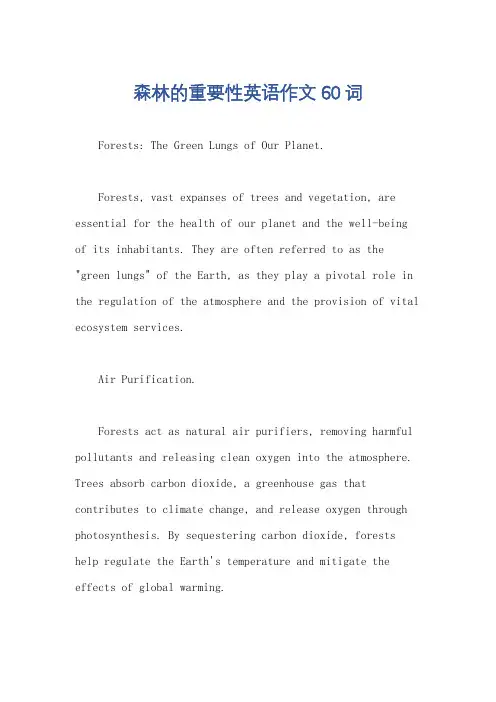
森林的重要性英语作文60词Forests: The Green Lungs of Our Planet.Forests, vast expanses of trees and vegetation, are essential for the health of our planet and the well-being of its inhabitants. They are often referred to as the "green lungs" of the Earth, as they play a pivotal role in the regulation of the atmosphere and the provision of vital ecosystem services.Air Purification.Forests act as natural air purifiers, removing harmful pollutants and releasing clean oxygen into the atmosphere. Trees absorb carbon dioxide, a greenhouse gas that contributes to climate change, and release oxygen through photosynthesis. By sequestering carbon dioxide, forests help regulate the Earth's temperature and mitigate the effects of global warming.Water Filtration and Regulation.Forests play a crucial role in the water cycle. Their dense vegetation intercepts rainfall, slowing down the flow of water and allowing it to infiltrate the soil. This process prevents soil erosion and flooding, while also replenishing groundwater reserves. Forest soils act as natural filters, removing impurities and pollutants from water before it enters streams and rivers.Biodiversity and Habitat.Forests are home to an astonishing array of plant and animal species. They provide food, shelter, and breeding grounds for countless organisms, ranging from tiny insectsto large mammals. The interconnected web of life within forests supports biodiversity and ecosystem balance, ensuring the stability and functionality of the environment.Climate Regulation.Forests influence the local and global climate bymoderating temperatures and humidity levels. Trees provide shade and release water vapor through transpiration, which cools the surrounding air. The dense vegetation also acts as a buffer against extreme weather events, such as storms and hurricanes, reducing their impact on communities and ecosystems.Economic and Social Benefits.Forests provide a multitude of economic and social benefits to humans. They are a source of timber, food, medicinal plants, and other products. Forest-based industries employ millions of people worldwide,contributing to economic development. Forests also support tourism, recreation, and cultural activities, enriching the lives of people while generating income.Forests at Risk.Despite their immense value, forests around the world are facing numerous threats. Deforestation, the clearing of forest land for agriculture, urbanization, or otherpurposes, is a major concern. Climate change is also posing a significant risk, as rising temperatures and altered precipitation patterns can lead to forest fires, droughts, and pest outbreaks.Conserving Our Forests.Conserving forests is essential for safeguarding the health of our planet and ensuring the well-being of future generations. Several measures can be taken to protect and restore forests, including:Reducing Deforestation: Implementing sustainable land use practices that minimize forest conversion and promote reforestation.Addressing Climate Change: Mitigating climate change through the reduction of greenhouse gas emissions and the implementation of adaptation measures.Sustainable Forest Management: Managing forests in a responsible manner to ensure the long-term sustainabilityof forest resources while protecting biodiversity.Awareness and Education: Raising awareness about the importance of forests and promoting responsible forest stewardship.Conclusion.Forests are vital ecosystems that play a multitude of essential roles for our planet and its inhabitants. They provide clean air, fresh water, biodiversity, climate regulation, and numerous economic and social benefits. Conserving forests is a collective responsibility that requires global cooperation and local action. By protecting and restoring our forests, we secure a sustainable future for ourselves and generations to come.。
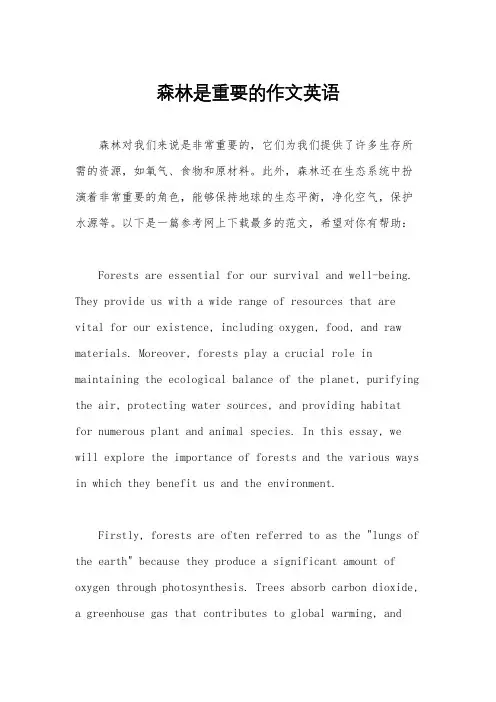
森林是重要的作文英语森林对我们来说是非常重要的,它们为我们提供了许多生存所需的资源,如氧气、食物和原材料。
此外,森林还在生态系统中扮演着非常重要的角色,能够保持地球的生态平衡,净化空气,保护水源等。
以下是一篇参考网上下载最多的范文,希望对你有帮助:Forests are essential for our survival and well-being. They provide us with a wide range of resources that are vital for our existence, including oxygen, food, and raw materials. Moreover, forests play a crucial role in maintaining the ecological balance of the planet, purifying the air, protecting water sources, and providing habitatfor numerous plant and animal species. In this essay, we will explore the importance of forests and the various ways in which they benefit us and the environment.Firstly, forests are often referred to as the "lungs of the earth" because they produce a significant amount of oxygen through photosynthesis. Trees absorb carbon dioxide, a greenhouse gas that contributes to global warming, andrelease oxygen into the atmosphere. This process is vitalfor human survival as we depend on oxygen for breathing. Without enough forests to produce oxygen, the air quality would deteriorate, leading to respiratory problems andother health issues.Secondly, forests are a valuable source of food and sustenance for both humans and wildlife. Many edible plants, fruits, and nuts are found in forests, providing nutrition and sustenance to people living in forested areas as wellas to animals that depend on these resources for survival. Forests also support biodiversity by providing habitat fora diverse range of plant and animal species, contributingto the overall health of ecosystems.Additionally, forests play a crucial role in regulating the climate and mitigating the impacts of climate change. Trees act as natural carbon sinks, absorbing carbon dioxide from the atmosphere and storing it in their biomass. This helps reduce the concentration of greenhouse gases in the atmosphere, thereby slowing down the pace of global warming. Forests also help regulate local climates by providingshade, reducing temperatures, and preventing soil erosion and desertification.Furthermore, forests are essential for maintainingwater cycles and preserving water quality. Trees play a key role in the water cycle by absorbing water from the soiland releasing it into the atmosphere through transpiration. This process helps regulate rainfall patterns and prevents floods and droughts. Moreover, forests act as natural filters, trapping pollutants and sediment, therebyimproving water quality in rivers, lakes, and groundwater sources.Apart from their environmental benefits, forests also have significant economic and social value. They provide livelihoods for millions of people worldwide, particularlyin rural areas where communities rely on forests for timber, fuelwood, medicinal plants, and non-timber forest products. Forests also support industries such as forestry, agriculture, tourism, and pharmaceuticals, contributing to economic development and employment opportunities.In conclusion, forests are crucial for our survival and well-being, providing us with essential resources, regulating the climate, preserving biodiversity, and supporting livelihoods. It is essential to conserve and sustainably manage forests to ensure their continued benefits for present and future generations. By protecting forests, we can protect the planet and secure a sustainable future for all life forms.。
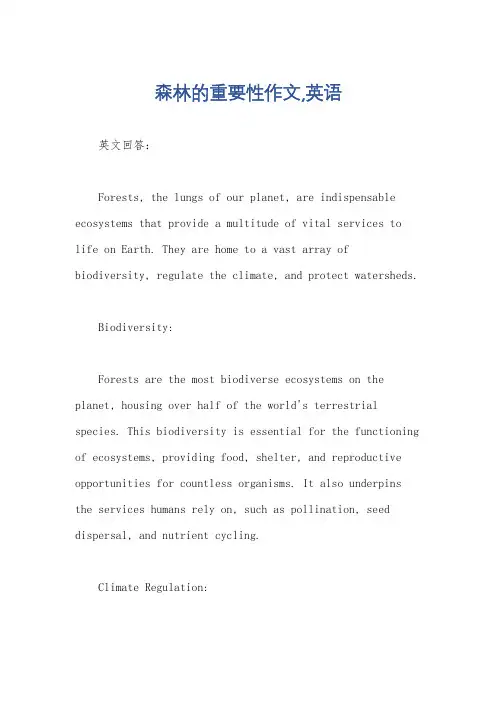
森林的重要性作文,英语英文回答:Forests, the lungs of our planet, are indispensable ecosystems that provide a multitude of vital services to life on Earth. They are home to a vast array of biodiversity, regulate the climate, and protect watersheds.Biodiversity:Forests are the most biodiverse ecosystems on the planet, housing over half of the world's terrestrial species. This biodiversity is essential for the functioning of ecosystems, providing food, shelter, and reproductive opportunities for countless organisms. It also underpins the services humans rely on, such as pollination, seed dispersal, and nutrient cycling.Climate Regulation:Forests play a crucial role in regulating the Earth's climate. Through photosynthesis, they absorb carbon dioxide from the atmosphere and release oxygen. They also help regulate temperature by providing shade and reducing wind speed. Extensive deforestation can exacerbate climate change by releasing stored carbon and disrupting the hydrological cycle.Watershed Protection:Forests act as natural reservoirs, absorbing rainfall and releasing it slowly into waterways. This process helps prevent flooding, maintains water quality, and supports downstream communities and ecosystems. The root systems of trees help stabilize soil, reducing erosion and further protecting water resources.Economic Benefits:In addition to their environmental benefits, forests also provide significant economic benefits. They are a source of timber, food, medicines, and other resources.Forests support livelihoods, particularly in rural communities, and contribute to the tourism industry. Sustainable forest management practices can balance these economic benefits with the protection of forest ecosystems.Threats to Forests:Despite their importance, forests face numerous threats. Deforestation, driven by agriculture, logging, and urbanization, is the primary cause of forest loss. Other threats include climate change, habitat fragmentation, and invasive species.Conservation and Restoration:Conserving and restoring forests is crucial for the health of our planet and its inhabitants. Measures toprotect forests include reducing deforestation,establishing protected areas, implementing sustainableforest management practices, and restoring degraded forests.中文回答:森林的重要性。

保护森林作文保护森林作文400字(通用50篇)保护森林作文篇1从前,在森林里有一个动物王国,那儿树木郁郁葱葱,湖水清澈见底,天空湛蓝深远,空气清新甜润。
王国境内有四个湖,一个叫红宝石湖,因为湖两岸都种着火红的花朵,像一颗颗红宝石镶嵌在湖边;另一个叫绿宝石湖,还有一个叫蓝宝石湖,最后一个叫紫珊湖。
原先这几个湖还是闪闪发光的,可是现在湖里的鱼经常生病,这是为什么呢?国王下令环保哆来咪小队去了解情况,查找原因。
小队成员哆哆,来来,咪咪街道命令后,立刻赶到现场,询问周边的居民,是否发生过异常情况;但是居民们都说没有发生任何异常状况。
哆来咪有去问小鱼队长关于鱼儿的病况,小鱼队长的描述是这样的:胸闷,头晕,气急,已有一些体弱多病的小鱼不幸去世了。
忽然,水面上漂来几株水葫芦,碧绿的叶子,非常好看。
“哦,我找到了一个原因了,应该是湖水缺氧了吧!”哆哆说。
“缺氧是为什么呢?”来来和咪咪迷惑不解。
“当然是水葫芦的原因喽!”哆哆环顾四周,发现湖边有许多生活垃圾,“哦!终于找到真正的原凶了,就是这些生活垃圾。
”于是,他们安排一些动物居民去捞水葫芦;另一些去清除湖边的生活垃圾;并告戒居民们不要乱倒生活垃圾,注意环境卫生;哆来咪还创作了一首歌,宣传保护环境的重要性。
几个月后,森林又跟以前一样美丽了,小鱼儿再也不生病了!保护森林作文篇2森林里住着活泼可爱的松鼠、唱歌悦耳的百灵鸟、机智的狐狸、勇猛的豹子……狮王沙尔特把国家治理得井井有条,大家都生活得非常快活。
可是有一天,一大群野猪进入了边界,这群野猪少说也有一千头!他们烧杀抢掠,害得很多动物无家可归。
沙尔特伤透了脑筋,召集大臣们商议如何打败野猪。
狈军师认为要用皇家军二千人与野猪搏斗,但是丞相狐狸反对,丞相说:“光用武力是打不赢的,要智取。
”“怎么智取!”大家异口同声。
狐狸说出计划:“把野猪引到山沟里,用火烧死它们!”“好!”“好!”大家都表示赞同,可谁去引呢?“就让松鼠去引吧,松鼠把它们骂出来,引到阿玛尔斯山的山沟,到时候我们放下一个篮子,拉松鼠上来,再扔草和火就行了。
森林的重要英语作文英文回答:Forests are vital ecosystems that provide numerous benefits to humans and the environment. They are home to a vast array of plants, animals, and microorganisms, and they play a crucial role in regulating the Earth's climate, purifying water, and supporting soil health.Climate Regulation: Forests absorb carbon dioxide from the atmosphere, which helps to mitigate climate change. Trees act as carbon sinks, storing carbon in their trunks, branches, and leaves. By absorbing carbon dioxide, forests help to regulate the Earth's temperature and reduce the effects of global warming.Water Purification: Forests help to filter and purify water. The roots of trees absorb water from the soil and release it into the atmosphere through transpiration, which helps to create clouds and rainfall. Forests also help toreduce erosion and protect watersheds, which are important sources of drinking water for humans and wildlife.Soil Health: Forests play a vital role in maintaining soil health. The roots of trees help to hold soil in place, preventing erosion and landslides. Trees also provide organic matter to the soil, which helps to improve soil fertility and water retention.Biodiversity: Forests are home to a wide variety of plants, animals, and microorganisms. They provide habitat for many endangered and threatened species, and they support complex food webs that are essential for the health of the ecosystem.Economic Benefits: Forests provide important economic benefits to humans. They provide timber for construction and paper, as well as other products such as fruits, nuts, and medicinal plants. Forests also support tourism and recreation, which can generate revenue for local communities.Social Benefits: Forests provide social and cultural benefits to humans. They are places of recreation and relaxation, and they can help to improve physical andmental health. Forests also have cultural and spiritual significance for many people around the world.Threats to Forests: Despite their importance, forests are facing numerous threats, including deforestation,climate change, and fragmentation. Deforestation occurs when forests are cleared for agriculture, development, or other purposes. Climate change is leading to changes in temperature and precipitation patterns, which can damage forests and make them more vulnerable to pests and diseases. Fragmentation occurs when forests are divided into smaller and smaller pieces, which can disrupt the movement of animals and plants and reduce the overall health of the ecosystem.Conservation: It is essential to conserve forests and protect them from these threats. There are a number ofthings that can be done to help conserve forests, including:Reduce Deforestation: Governments and businesses can work together to reduce deforestation by promoting sustainable forestry practices and encouraging the use of alternative materials.Address Climate Change: Addressing climate change will help to protect forests from the impacts of rising temperatures and changing precipitation patterns.Protect Watersheds: Protecting watersheds will help to ensure that forests have access to clean water, which is essential for their health.Educate the Public: Educating the public about the importance of forests can help to build support for conservation efforts.By taking these steps, we can help to conserve forests and ensure that they continue to provide their manybenefits to humans and the environment.中文回答:森林的必要性。
关于森林的大学英语作文The Importance of Forests1. IntroductionForests, the lungs of our planet, play a pivotal role in maintaining the ecological balance of our environment. They are not just vast tracts of trees but also a complex ecosystem that supports a diverse range of plant and animal species. The significance of forests extends far beyond their aesthetic value, encompassing their role in climate regulation, water cycling, soil conservation, and biodiversity preservation.引言森林,作为我们地球的“肺”,在维持我们环境生态平衡方面发挥着至关重要的作用。
它们不仅仅是树木的广阔地带,更是一个复杂的生态系统,支持着多种多样的植物和动物物种。
森林的重要性远远超出了其美学价值,涵盖了它们在气候调节、水循环、土壤保持和生物多样性保护方面的作用。
2. Climate RegulationForests act as natural carbon sinks, absorbing carbon dioxide from the atmosphere through photosynthesis. This process helps mitigate the effects of climate change by reducing the concentration of greenhouse gases in the air. Trees also release water vapor during transpiration, which contributes to cloud formation and rainfall, further regulating the climate.气候调节森林作为天然的碳汇,通过光合作用从大气中吸收二氧化碳。
保护森林的重要性和措施英语作文The Importance of Protecting Forests and How We Can HelpHi there! My name is Emma, and I'm 10 years old. Today, I want to talk to you about something that's really important to me – protecting our forests. Forests are amazing places filled with all kinds of plants and animals, and they're also really important for keeping our planet healthy. But sadly, a lot of forests around the world are being cut down, and we need to do something to stop this from happening.Why Are Forests So Important?Forests are like the lungs of our planet. The trees in forests take in carbon dioxide (which is a gas that can be harmful if there's too much of it in the air) and release oxygen (which is the air that we need to breathe). Without forests, there would be a lot more carbon dioxide in the air, and it would be harder for us to breathe.Forests are also home to millions of different kinds of plants and animals. From tall trees to tiny bugs, forests provide a safe place for all these creatures to live and grow. If we cut down too many forests, a lot of these plants and animals might not have anywhere else to go, and they could disappear forever.Forests also help to keep our planet cool. The trees provide shade and release water vapor into the air, which helps to lower the temperature. Without forests, the earth would get a lot hotter, and that could cause all sorts of problems like melting ice caps and rising sea levels.Another really important reason to protect forests is that they provide us with lots of useful things. We get things like wood for building, paper for writing and drawing, and even some of the medicines we take when we're sick. Forests also provide food and shelter for many people who live near them.So as you can see, forests are really important for keeping our planet healthy and providing us with the things we need to live. That's why it's so important that we do everything we can to protect them.What's Happening to Our Forests?Sadly, a lot of forests around the world are being cut down or destroyed. This is often done to make space for things like farms, buildings, and roads. Sometimes, forests are also cut down so that the wood can be sold and used for things like making furniture or paper.When forests are cut down, it's not just the trees that are affected. All the plants and animals that live in the forest also lose their homes, and many of them might not be able to survive. Cutting down forests can also lead to soil erosion, which is when the soil gets washed away and can't support new plants or trees.It's important that we try to stop forests from being cut down or destroyed, because once they're gone, it's really hard to get them back. It can take many, many years for a forest to grow back, and even then, it might not be the same as it was before.What Can We Do to Protect Forests?So now that we know how important forests are and what's happening to them, you might be wondering what we can do to help protect them. Well, there are lots of things that we can do, both big and small.One of the most important things we can do is to plant more trees. This can help to replace some of the forests that have been cut down, and it can also provide new homes for plants and animals. You could even plant a tree in your own backyard or at your school!Another thing we can do is to use less paper and wood products. This means things like recycling paper instead ofthrowing it away, and trying to use less wood for things like building or furniture. We can also try to buy products that are made from recycled materials instead of new ones.We can also learn more about the importance of forests and share this information with others. Maybe you could do a project or presentation at school to teach your classmates about why forests are so important and what we can do to protect them.Another really important thing we can do is to support organizations and groups that are working to protect forests. These groups often need volunteers to help with things like planting trees or cleaning up forests, and they also need money to help pay for their work.Finally, we can try to make our voices heard by writing letters or emails to our leaders and politicians, asking them to do more to protect forests. We can also participate in things like peaceful protests or rallies to show how much we care about this issue.Protecting Our Forests for the FutureAs you can see, there are lots of different things that we can do to help protect our forests. Some of them might seem small, but every little bit helps. And if we all work together and do our part, we can make a big difference.Forests are so important for our planet and for all the plants and animals that live in them. They provide us with so many things that we need to survive, and they help to keep our planet healthy and balanced. That's why it's so important that we do everything we can to protect them.I know that it might seem like a big task, but we can't give up. We have to keep fighting to protect our forests, because they're not just important for us – they're important for everyone and everything that lives on this planet. And if we work together, I know that we can make a difference.So let's get out there and start planting trees, recycling paper, and spreading the word about how important forests are. Let's show the world that we care about our planet and thatwe're willing to do whatever it takes to protect it. Because at the end of the day, the forests are our responsibility, and it's up to us to make sure that they're still around for many, many years to come.。
森林的重要性作文,英语English:Forests play a crucial role in maintaining the balance of our ecosystem and providing numerous benefits to both the environment and humans. They act as a habitat for countless species of plants and animals, contributing to biodiversity and preserving the natural food chain. Moreover, forests help in regulating the Earth's climate by absorbing carbon dioxide and releasing oxygen through the process of photosynthesis. This not only mitigates the impact of climate change but also improves the quality of the air we breathe. Additionally, forests play a significant role in maintaining soil health and preventing erosion. They act as a natural water filter, helping in preserving water quality and regulating water flow. Furthermore, forests provide valuable resources such as timber, medicine, and food, supporting the livelihoods of millions of people around the world. Overall, forests are essential for sustaining life on Earth and it is crucial that we protect and preserve them for future generations.中文翻译:森林在维持生态系统平衡和为环境和人类提供许多好处方面发挥着至关重要的作用。
森林的重要性英语作文120英文回答:Forests are vital ecosystems that provide countless benefits to humans and the planet. They are home to a vast array of plant and animal species, regulate the climate, provide essential resources, and support livelihoods.1. Biodiversity: Forests are the most biodiverse ecosystems on Earth, harboring up to 80% of the world's terrestrial species. They provide a habitat for countless animals, insects, birds, and plants, ensuring the ecological balance of our planet.2. Climate Regulation: Forests play a crucial role in regulating the Earth's climate. They absorb carbon dioxide, a greenhouse gas, and release oxygen. By acting as carbon sinks, forests help mitigate the effects of climate change.3. Water Conservation: Forests act as natural waterfilters, purifying water and regulating its flow. Their root systems help retain rainwater, preventing soil erosion and regulating river flow, ensuring a steady supply of clean water for communities.4. Economic Importance: Forests provide essential resources such as timber, firewood, and non-timber forest products like fruits, nuts, and medicinal plants. These resources support the livelihoods of millions of people worldwide and contribute to economic development.5. Cultural and Spiritual Significance: Forests have cultural and spiritual significance for many indigenous communities around the world. They are often considered sacred spaces and provide a source of cultural identity, traditional practices, and spiritual renewal.中文回答:森林是至关重要的生态系统,为人类和地球提供了无数好处。
Forests: The Vital Green Lungs of Our Planet Forests, the lush green canvases that dot our planet, are essential to the survival and well-being of all life on Earth. They serve as the lungs of our planet, inhaling carbon dioxide and exhaling oxygen, thus maintaining a healthy balance in our atmosphere. Beyond their ecological significance, forests play crucial roles in our economic, social, and cultural fabrics.Ecologically, forests are the backbone of our global ecosystem. They are home to a diverse array of plant and animal species, providing habitats for countless creatures. These forests act as natural filters, purifying water and air, and mitigating the impact of climate change by absorbing and storing carbon. Forests also play a vitalrole in regulating the global climate by providing shade and cooling the Earth's surface through evaporation.Economically, forests are a vital resource for sustainable development. They provide raw materials for industries such as lumber, paper, and pharmaceuticals. Forests also support agricultural systems by providing soil fertility and water conservation. Additionally, theyattract tourists and contribute to local economies through ecotourism.Socially, forests are integral to the cultural identity and livelihoods of many communities. They are often the heart of local traditions and customs, serving as places of worship, recreation, and inspiration. Forests provide critical resources for subsistence living, such as food, medicine, and fuel.Culturally, forests have been a source of inspiration for generations. They have influenced art, literature, music, and spirituality, serving as a canvas for creative expression and reflection. Forests have also been repositories of knowledge and wisdom, passed down through generations of forest dwellers.However, despite their immense value, forests are facing unprecedented threats. Deforestation, illegal logging, and climate change are taking a heavy toll on our global forest cover. This loss not only impacts the biodiversity and ecological balance of our planet but also threatens the economic stability and cultural heritage of forest-dependent communities.It is imperative that we take urgent action to protect and restore our forests. Policies that promote sustainable forest management, conservation, and reforestation must be implemented to halt the tide of deforestation. We must also raise awareness about the importance of forests and encourage public participation in forest protection efforts. In conclusion, forests are the lifeblood of our planet, essential for maintaining a healthy and sustainable ecosystem. They provide invaluable economic, social, and cultural benefits to humanity and are repositories of our collective memory and wisdom. It is our responsibility to cherish, protect, and restore our forests to ensure a sustainable future for all.**森林:我们星球的重要绿肺**森林,这个点缀在我们星球上的郁郁葱葱的绿色画布,对于地球上所有生命的生存和福祉至关重要。
森林的重要性
原本,森林对我来说,是绿的,是美丽的,那里的绿,令人清新自在,那里的美丽,令人流连忘返。
而现在,那绿绿的,美丽的森林却是不堪入目的。
看,那一棵棵茁壮的大树变成只看得到年轮的树
根;看,那一座座茂盛的山岭渐渐变成裸露的荒山。
这一切的一切,是谁造成的?哦!是人类,是人类一颗颗贪婪的心。
据了解,我国的黄土高原,原来森林的覆盖率在西周时期达53%,而现在,因为人类大量砍伐树木,所以高原缺少树木的保护,导致高原的水土流失极为严重,从而变成了荒漠。
我们应该要世界知道,我们应该让世界明白破坏世界的严重性。
破坏森林,它会让世界变得灾难重重,因为森林是绿色的屏障,树木是人类的保护者。
如果世界上没有树,水灾。
旱灾。
地震。
火灾??????就会一个个的接踵而来;如果世界没有树,我们怎么呼吸,因为再也没有树木来给我们吸收二氧化碳,释放清爽的空气,我们又该怎么生存?
因此,我们一方面要植树造林,不断扩大森林植被面积;另一方面要保护好现有的森林资源,要森林成为大地的绿色屏障,再实现生态的良性循环中发挥重要作用。
所以,为了动物,为了生存,为了世界,行动起来,一
起共创美好家园!。